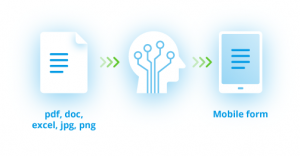 The app development market is expected to grow by leaps and bounds, potentially becoming a 6.3 trillion dollar economy by 2021. Today business app developers focus on cross-platform mobile app development, and try to understand whether this will be the right and beneficial solution for companies. Native apps are usually fast and high performing. However for some businesses, developing several apps of different platforms for the same purpose is time-consuming, expensive and does not seem like efficient strategy. Cross-platform apps become a more reasonable choice for them in this context. Here are some pros and cons of choosing cross-platform app development.
The app development market is expected to grow by leaps and bounds, potentially becoming a 6.3 trillion dollar economy by 2021. Today business app developers focus on cross-platform mobile app development, and try to understand whether this will be the right and beneficial solution for companies. Native apps are usually fast and high performing. However for some businesses, developing several apps of different platforms for the same purpose is time-consuming, expensive and does not seem like efficient strategy. Cross-platform apps become a more reasonable choice for them in this context. Here are some pros and cons of choosing cross-platform app development.
Pros
Lower development costs
Businesses pay for a native app development. And further this cost will multiply for every native platform the app is coded for. With cross-platform apps, there is a single code for multiple platforms and it is reusable. This contributes to relatively lower costs during development.
Faster delivery to the market
In cross-platform apps changes have to be coded only once. All updates can be deployed and synced across every device at the same time. This contributes to faster delivery of different modifications to the market.
Wider reach of the audience
With cross-platform apps you can contact iOS and Android users at the same time. This will allow you to capture a larger share of the market faster, build a user base in a short time and see a more complete picture of business development.
Better Cloud integration
Cross-platform apps can be easily integrated with cloud settings. Only one source code needs to be coordinated. This enhances a compatibility with any plugins and extensions.
Cons
More time for code maintenance
Most of apps should be updated each time any OS is updated to keep compatibility. Also, after the update, the compatibility should be tested with all the platforms the app is running on. This requires some time.
Low flexibility
While coding for multiple platforms, developers invariably lose access to certain features of the OS, API’s and the device. Certain features of all platforms should be dropped out to provide features that are supported on every device. Full integration and flexibility are sacrificed.
Restrictions in graphics
When it comes to heavily graphic reliant apps, cross-platform apps may be not the best solution. Developers may face severe restrictions on the 3D graphics or complex graphical user interfaces. Apps may not have access to core graphics libraries, and it will have an impact on performance.
Security concerns
Cross-platform apps can be vulnerable to threats that affect different platforms in different ways. Also, all cross-platform apps that deal with user or corporate data have to be compliant to security features for all the platforms it runs on. This is not an easy task.
Considering app development for your business? Snappii can become your leader in this process. We create powerful business apps for a plenty of industries for about 10 year. Our customers appreciate us for the highest standards, rapid and cost effective work, agility, excellent support and high quality of service. Snappii has helped hundreds of companies. Contact us to learn more and discuss your requirements.

 Login
Login

 Today’s facility manager is under pressure to keep everything under control. Complying with strict regulatory standards, regular inspections, maintaining assets and more are among the major duties. The facility manager who relies on outdated manual processes of operations with data is not equipped to succeed in this field and maintain a high level of service quality. Here are a few ways that modern mobile solutions can help overcome challenges of facility management and elevate service quality.
Today’s facility manager is under pressure to keep everything under control. Complying with strict regulatory standards, regular inspections, maintaining assets and more are among the major duties. The facility manager who relies on outdated manual processes of operations with data is not equipped to succeed in this field and maintain a high level of service quality. Here are a few ways that modern mobile solutions can help overcome challenges of facility management and elevate service quality. Mobile business apps are a significant advantage for any company. There are a plenty of tasks to be monitored while doing a business. Having an app means you can provide your employees with a digital experience to optimize and accelerate usual operations, as well as get an overview and a complete control over the entire workflow.
Mobile business apps are a significant advantage for any company. There are a plenty of tasks to be monitored while doing a business. Having an app means you can provide your employees with a digital experience to optimize and accelerate usual operations, as well as get an overview and a complete control over the entire workflow. Regular inspections of workplace are essential. It influences safe and efficient work process. Inspections are traditionally performed with paper forms and checklists. However nowadays businesses realize the inconvenience and unreliability of paper and prefer digital analogue, such as inspection apps and mobile forms. Recent study showed that companies are increasing efficiency by about 50% after going digital. Here are the major benefits they will get from mobile apps for workplace inspection.
Regular inspections of workplace are essential. It influences safe and efficient work process. Inspections are traditionally performed with paper forms and checklists. However nowadays businesses realize the inconvenience and unreliability of paper and prefer digital analogue, such as inspection apps and mobile forms. Recent study showed that companies are increasing efficiency by about 50% after going digital. Here are the major benefits they will get from mobile apps for workplace inspection. People use apps in almost every facet of their life and work. It should come as no big surprise that modern mobile construction apps provide huge impact on this industry and change the way different construction operations are being done. Construction projects require a serious amount of coordination of people and resources in the field. Special construction apps do an excellent job of this task, as well as provide many other benefits, helping construction companies of all sizes be more efficient and cost-effective.
People use apps in almost every facet of their life and work. It should come as no big surprise that modern mobile construction apps provide huge impact on this industry and change the way different construction operations are being done. Construction projects require a serious amount of coordination of people and resources in the field. Special construction apps do an excellent job of this task, as well as provide many other benefits, helping construction companies of all sizes be more efficient and cost-effective. In view of recent events and the spread of COVID-19, effective cleaning and disinfection of facilities, property and various objects are now more important than ever. Businesses are reopening and it is essential to ensure safe and healthy workplaces. Let’s pay special attention to elevators in this blog post. It is one of the most demanded and frequently used places. People may only be inside an elevator cab for a few seconds, but it only takes one press of a button to spread illness-causing germs and infection. This way, cleaning and disinfecting elevators properly and frequently is key. Here are some tips for efficient cleaning and disinfection.
In view of recent events and the spread of COVID-19, effective cleaning and disinfection of facilities, property and various objects are now more important than ever. Businesses are reopening and it is essential to ensure safe and healthy workplaces. Let’s pay special attention to elevators in this blog post. It is one of the most demanded and frequently used places. People may only be inside an elevator cab for a few seconds, but it only takes one press of a button to spread illness-causing germs and infection. This way, cleaning and disinfecting elevators properly and frequently is key. Here are some tips for efficient cleaning and disinfection. We want to believe that the worst is over and the world is recovering after the COVID-19 pandemic. Companies are on the road to resume business activities. Business travelling is one of them. In this blog post we will discuss such essential point as business travel expenses.
We want to believe that the worst is over and the world is recovering after the COVID-19 pandemic. Companies are on the road to resume business activities. Business travelling is one of them. In this blog post we will discuss such essential point as business travel expenses. Field service managers can do much to encourage and progress their employees. With the right management and support, they could build new leaders who will take a company to new heights.
Field service managers can do much to encourage and progress their employees. With the right management and support, they could build new leaders who will take a company to new heights. Any company using forms and creating PDF reports can now go digital instantly without investment of time and money.
Any company using forms and creating PDF reports can now go digital instantly without investment of time and money.  Paper documentation steps back
Paper documentation steps back A maintenance inspection is the process of evaluation the condition of facilities and equipment. The purpose of such inspection is to determine what is needed to keep them in good working condition. Also, maintenance inspections can identify issues before they turn into costly repairs, as well as prevent downtime. Every enterprise or facility must conduct regular inspections as part of the entire maintenance program. It’s important to note, that inspections should be documented and stored.
A maintenance inspection is the process of evaluation the condition of facilities and equipment. The purpose of such inspection is to determine what is needed to keep them in good working condition. Also, maintenance inspections can identify issues before they turn into costly repairs, as well as prevent downtime. Every enterprise or facility must conduct regular inspections as part of the entire maintenance program. It’s important to note, that inspections should be documented and stored. Business recovery after COVID-19
Business recovery after COVID-19